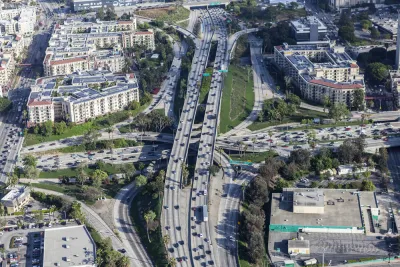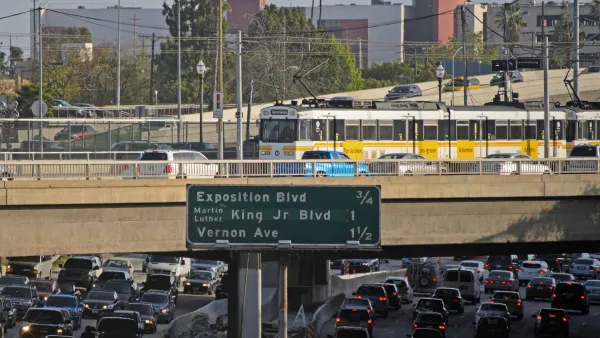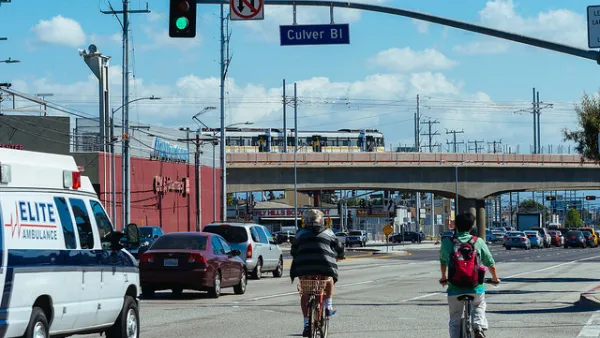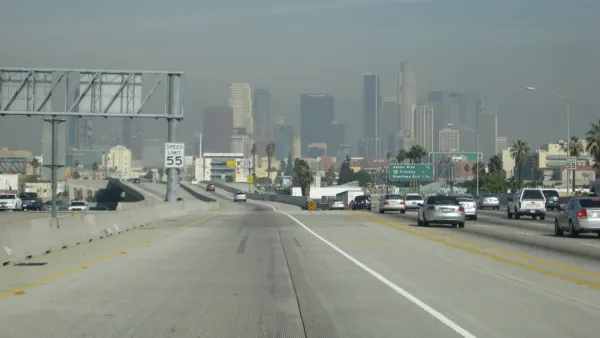Los Angeles Metro CEO Phil Washington will recommend to his board next Thursday that they pursue a congestion pricing program to reduce traffic congestion, improve transit, and subsidize transit fares in Los Angeles in time for the 2028 Olympics.

"Metro CEO Phil Washington told members of the transit agency’s congestion, highway and roads committee on Wednesday that staffers would recommend pursuing 'some form' of congestion pricing at a [Jan. 24] meeting of the Board of Directors next week," reports
Congestion Pricing in Los Angeles?" (December 10, 2018): The city of Los Angeles is looking for ways to close a $26.2 billion funding gap for its plan to complete 28 transportation projects by the 2028 Summer Olympics.]
Metro Board member John Fasana, who chairs the ad hoc committee, warned that it would be difficult to start charging drivers for road access that is currently unpriced.
“It really does create a policy dilemma,” said Fasana. “It’s a concept that is not popular, but also I think when you look at it in the context of demand and supply, it might be the least costly way of managing demand.”
Several committee members expressed concerns about the equity of a congestion pricing system, pointing out that such policies are regressive—that is, they benefit wealthy drivers who can pay for faster commutes, while hurting poorer residents who can’t afford the tolls.
Manville, who hails from Reading, Mass., addresses those issues directly on a Commonwealth Codcast on Jan. 22, 2018 with Josh Fairchild and James Aloisi of the Boston-based transit advocacy group, TransitMatters, as a congestion pricing proposal was under consideration for Boston. He suggests that one of the best ways to address equity concerns is to subsidize tolls for low income drivers, a program which already exists for Metro ExpressLanes that may be emulated on new managed lanes in San Mateo County in the Bay Area.
However, he states on the Codcast that "it's important to remember that free roads disproportionately benefit higher income people" because they drive more than low-income motorists, especially at peak hours. "Free roads are not an important subsidy for low income people," stresses Manville.
"Washington did not fully reveal Wednesday what staff would recommend to the board next week, but said that an advisory council should be formed to further investigate how a congestion pricing policy would work in Los Angeles," adds Chiland.
Hurdles ahead
Legislative approval would likely be needed. Last year, a bill to allow Los Angeles and three other California cities to pursue "Go Zones" was withdrawn before it was even heard in committee.
Other cities pursuing cordon area congestion pricing
- As posted Jan. 16, congestion pricing took a major step forward in New York when Democratic Gov. Andrew Cuomo announced intentions in his state-of-the state address to reattempt a version of Fix NYC that would need legislative approval. "Now that both the state Assembly and the state Senate are controlled by Democrats, he’s confident that it will finally pass," reports Ameena Walker for Curbed New York on Jan. 16.
- Last April, Seattle Mayor Jenny Durkan announced that her plan to reduce emissions from the transportation sector, responsible for two-thirds of the city's greenhouse gas emissions, would include cordon area congestion pricing, i.e., the tolling of downtown streets. If adopted, it would feature prominently in the Seattle Climate Action plan. A local business group was supportive of the plan but expressed caution in the post, "Getting the Politics of Seattle Cordon Tolling Right."
- An approved Portland plan to apply value pricing (another term for congestion pricing) to all lanes on parts of two interstates was submitted to the Federal Highway Administration by the Oregon Transportation Commission last month for approval as a pilot program. However, an earlier version of the plan would have included more roadways and would have come close to cordon area tolling.
Hat tip to MTC News Headlines.
FULL STORY: Metro will recommend moving forward with congestion pricing, says CEO

Analysis: Cybertruck Fatality Rate Far Exceeds That of Ford Pinto
The Tesla Cybertruck was recalled seven times last year.

National Parks Layoffs Will Cause Communities to Lose Billions
Thousands of essential park workers were laid off this week, just before the busy spring break season.

Retro-silient?: America’s First “Eco-burb,” The Woodlands Turns 50
A master-planned community north of Houston offers lessons on green infrastructure and resilient design, but falls short of its founder’s lofty affordability and walkability goals.

Test News Post 1
This is a summary

Analysis: Cybertruck Fatality Rate Far Exceeds That of Ford Pinto
The Tesla Cybertruck was recalled seven times last year.

Test News Headline 46
Test for the image on the front page.
Urban Design for Planners 1: Software Tools
This six-course series explores essential urban design concepts using open source software and equips planners with the tools they need to participate fully in the urban design process.
Planning for Universal Design
Learn the tools for implementing Universal Design in planning regulations.
EMC Planning Group, Inc.
Planetizen
Planetizen
Mpact (formerly Rail~Volution)
Great Falls Development Authority, Inc.
HUDs Office of Policy Development and Research
NYU Wagner Graduate School of Public Service




























